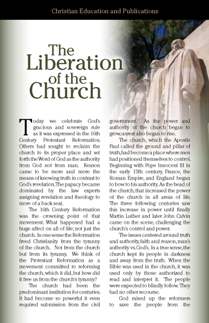Christian Education and Publications Email Privacy Policy
We have created this privacy policy to demonstrate our firm commitment to your privacy and the protection of your information.
Why are you receiving a mailing from us?
Our email marketing is permission based. If you received a mailing from us, our records indicate that either you have expressly shared this address for the purpose of receiving information in the future, or you have registered or purchased or otherwise have an existing relationship with us. We respect your time and attention by controlling the frequency of our mailings. If you believe you have received unwanted, unsolicited email sent via this system or purporting to be sent via this system, please forward a copy of that email with your comments to info@pcacep.org for review.
How can you stop receiving email from us?
Each email sent contains an easy, automated way for you to cease receiving email from us, or to change your expressed interests. If you wish to do this, simply follow the Unsubscribe link at the end of any email.
How we protect your privacy
We use appropriate security measures to protect against the loss, misuse and alteration of data used by our system.
Sharing and Usage
CEP never share, sell, or rent individual personal information with anyone for their promotional use without your advance permission or unless ordered by a court of law. Information submitted to us is only available to employees managing this information for purposes of contacting you orsending you emails based on your request for information.

 ‘Georgia’s eyes twinkled, and she could not stifle her grin. Her whole face betrayed her excitement. She was leading a devotion for the women on our committee.”Girls,” she announced with glee, “we are frapping cables!*”‘
‘Georgia’s eyes twinkled, and she could not stifle her grin. Her whole face betrayed her excitement. She was leading a devotion for the women on our committee.”Girls,” she announced with glee, “we are frapping cables!*”‘
 A heart for seeing this promise fulfilled is what brought together 20 passionate leaders from around the PCA on May 4th to discuss the 2020 Vision Strategy for Growing the Church Through Ministry to Youth and Children.
A heart for seeing this promise fulfilled is what brought together 20 passionate leaders from around the PCA on May 4th to discuss the 2020 Vision Strategy for Growing the Church Through Ministry to Youth and Children. The 2010 Reformation Inserts are here! This year we celebrate Reformation Sunday on October 31st. Reformation Sunday is a time to celebrate our theological roots. It is a great opportunity to educate our congregations on the importance of what the Reformers did and the implications that it has for us today.
The 2010 Reformation Inserts are here! This year we celebrate Reformation Sunday on October 31st. Reformation Sunday is a time to celebrate our theological roots. It is a great opportunity to educate our congregations on the importance of what the Reformers did and the implications that it has for us today.